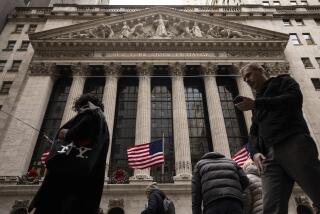THE ECONOMY : Analysts See Continued Sluggishness Through End of ’94
- Share via
WASHINGTON — The U.S. economy will continue to plod along sluggishly at least through the end of next year, with low interest rates doing little to stimulate growth, a group of private economists said Monday.
In its quarterly forecast, the National Assn. of Business Economists also predicted that inflation will remain subdued and that there will be little decline in the jobless rate, which stood at 6.7% last month.
The forecast, based on a survey of 41 NABE members taken in late August, is somewhat less optimistic than the previous survey of the panel taken in May.
The group expects the country’s gross domestic product to grow at an annual average 2.5% this year and 2.8% in 1994, instead of the 3% annual pace it had predicted in May for each of the two years.
The outlook for GDP, the nation’s total output of goods and services, reflects a continuation of last year’s sluggish 2.6% growth. In the first half of 1993, the economy advanced at an anemic 1.3% annual rate.
Despite historically low interest rates, the NABE panel expects no improvement in the sectors of the economy that are most sensitive to interest rates. The panel predicted a lower growth rate next year for business spending and housing starts than it did in May and did not change its outlook for car sales.
“What this suggests is that interest rates are low because the economy is expected to remain weak, not that lower interest rates will make a weak economy strong,” the NABE said in a summary of its survey.
Inflation, as measured by the consumer price index, will edge up only slightly from 1992, growing at an annual average 3.2% this year and 3.3% next year, the group predicted. Last year, consumer prices rose 2.9%.
Little improvement was forecast for the job market, with the annual average unemployment rate expected to be 6.9% in 1993 and 6.6% next year.
Contributing to the sluggishness of the economy is an expected worsening of the country’s trade deficit this year and next, caused in part by an expected rise in the value of the dollar over the next 12 months and ongoing weakness in the economies of major U.S. trading partners, the NABE said.
However, the economists said the low interest rates, combined with the recently passed federal budget, will reduce the government’s budget deficit this year to $280 billion and next year to $250 billion from the $323 billion and $300 billion, respectively, forecast in the May survey.
In a separate survey of 228 of its members in August, the NABE said about three-quarters of the respondents believe the Federal Reserve Board’s monetary policy is “about right” for now.
Over the next six months, nearly two-thirds of the economists believe, monetary policy should remain where it is, with a slight majority of the remaining respondents favoring more stimulative rather than more restrictive policy.
More to Read
Inside the business of entertainment
The Wide Shot brings you news, analysis and insights on everything from streaming wars to production — and what it all means for the future.
You may occasionally receive promotional content from the Los Angeles Times.










